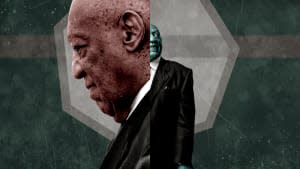The Cosby decision isn't justice. But it's fair.
- Oops!Something went wrong.Please try again later.

Bill Cosby, the once-beloved comedian turned convicted sexual assailant whose case helped to kick off the global #MeToo movement, is set to be released from prison after his conviction was overturned by the Pennsylvania Supreme Court. It's a blow to the 60-odd women who have accused Cosby of sexual misdeeds, ranging from rape to sexual harassment to groping, and particularly devastating for Andrea Constand, the woman Cosby was eventually convicted of drugging and raping.
The case is complicated, though, by errors made by the prosecution. Essentially, an earlier prosecutor believed there was little chance of winning in a criminal trial on Constand's claims, and that the best way for her to get justice would be to triumph in civil court. But to do that, Cosby needed to testify under oath. And so the prosecutor sent out a press release affirming that Cosby would not be criminally prosecuted, at which point Cosby could no longer claim his Fifth Amendment right against self-incrimination. Cosby was deposed in the case, testified under oath, and eventually settled with Constand. Years later, with a new prosecutor in office, Cosby's testimony was unsealed and used to convict him in a criminal proceeding, and he was sentenced to three to ten years. His lawyers appealed, and Wednesday they won.
There are some important catches here: The first prosecutor didn't go through the formal process of immunizing Cosby; rather, he made a public promise in the name of the commonwealth of Pennsylvania, and Cosby (and his lawyers) relied upon that. As the dissent in the Pennsylvania Supreme Court decision notes, one would have expected to find more of a paper trail indicating such a significant promise existed (the dissent, though, supports giving Cosby a new trial on the grounds that allowing testimony from other women who claimed Cosby sexually assaulted them was unfairly prejudicial).
But it is clear that a previous prosecutor made a public commitment to not prosecute Cosby, and that Cosby relied on that promise when he testified in the civil case against him. One can find the outcome – Cosby released after two years – detestable while also conceding that Cosby's due process rights were violated, and that the prosecution changed the rules midway through the game.
What's also clear is the degree to which power and mostly-male assumptions about credibility and sexual violence played into the prosecution's initial decision not to move forward with the criminal case against Cosby. The prosecutor at the time didn't believe the case was winnable because it took Constand almost a year to go to the police after the alleged assault, and there was no physical evidence to back up her claims. He didn't find her credible; there were some inconsistencies in her story, he said, and he counted against her the fact that she had consulted a lawyer. Constand and her mother had recorded conversations with Cosby, a fact the prosecutor also interpreted as evidence they were trying to get money from a wealthy man.
The most generous reading of the situation is that this prosecutor correctly ascertained that it's difficult to get a conviction in sexual assault cases, and exponentially more so when the accused is a beloved man with deep pockets and the accuser is someone who didn't immediately behave the way rape victims do on television. Either way, it's an indictment – of the prosecution, of Bill Cosby, of our justice system, and of our country.
After the #MeToo movement swept the nation, many of these facts look different. We now know that most women do not report sexual violence immediately. We know that there is reflexive disbelief leveled at women who accuse men of sexual assault, and that the bar for proving a sexual assault happened is often absurdly high – that a woman's word isn't given the same weight as a man's in the court of public opinion. Sixty women's words against one man's, though – that was convincing. In that new context, a different Pennsylvania prosecutor decided to bring criminal charges against Cosby.
We also know that American prisons are teeming with people who were over-charged, over-sentenced, poorly represented, and badly mistreated by the system. We know that police and prosecutorial misconduct is a scourge that lands untold numbers of people behind bars – and sometimes gets them unjustly sentenced to death.
That Cosby is the person the system worked for isn't simple good luck for him, as outrageous as it is to all of the rest of us. It's a function of who the people who make up our criminal justice systems privilege – the wealthy and well-connected over the struggling, men over women (the one thing the Cosby case turns on its head is the usual racial dynamics).
The answer, though, isn't to extend the justice system's pervasive unfairness to Cosby, too. It's to hold our noses as the court issues a fair rebuke of the prosecution's conduct. It's to recognize that all the women who say they were assaulted by Cosby are not getting the justice they were due, because sometimes a fair process and a just result wind up at odds. And it's to work to improve these systems built and maintained by fallible and biased human beings so they might mete out more fairness to those who need it most — and those whose cases don't make the headlines.
You may also like
Men are rapidly losing their close friends, poll finds
Anti-woke zealots are trying to politically purge the military
Democrats fear Mitch McConnell is stoking infrastructure 'infighting'
